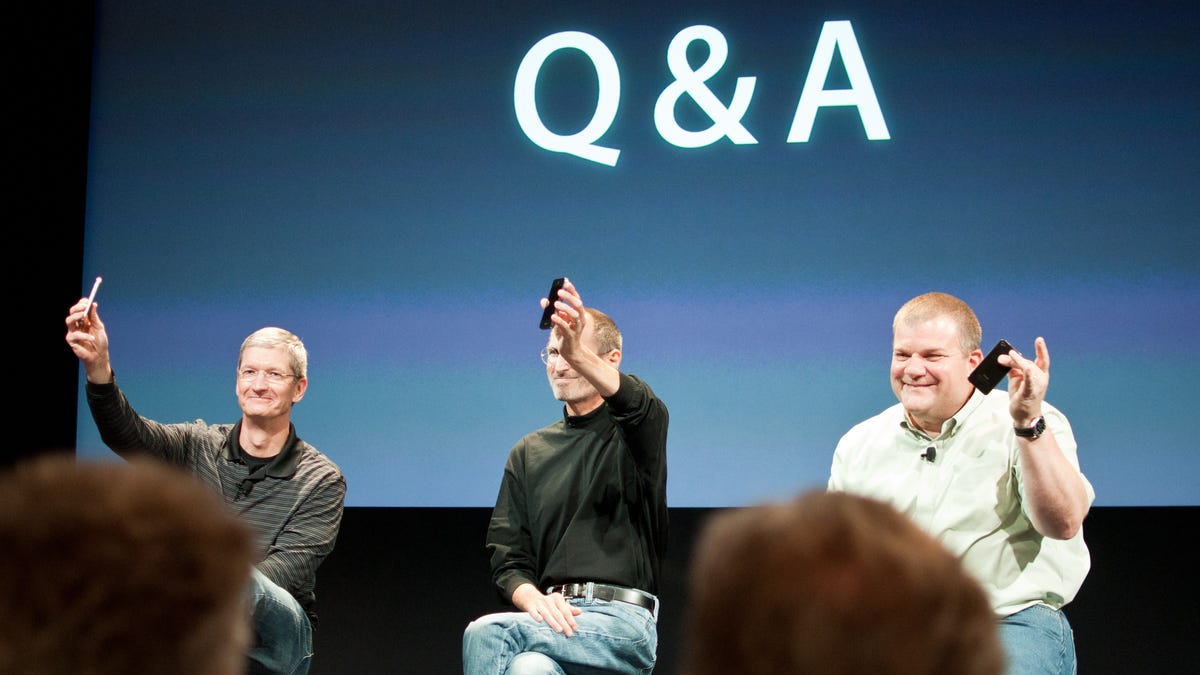With medical leave, more questions about Jobs' successor
As Tim Cook once again steps up during an absence by Steve Jobs, it's clear that--in the short term, at least--Apple investors have confidence in him. But that doesn't settle the long-term worries.

Though Steve Jobs' presence at Apple is almost universally regarded as essential to the company's long run of amazing success, we've seen that--in small doses, at least--it can do pretty well without him.
Back-to-back blowout quarters in early 2009, a successful iPhone 3GS launch, and the finishing touches on a new iPhone OS, Mac OS, and new lineup of iPods all took place while Jobs stepped away from the company for six months beginning in January 2009 to get a liver transplant.
The man credited for making Jobs' absence minimally felt was Chief Operating Officer Tim Cook.
In an e-mail to employees todayannouncing an indeterminate break to focus on his health, Jobs has again tapped the same man to take the reins for him temporarily. While Jobs is gone, Cook will handle the day-to-day duties of running Apple--which is what he basically does anyway--which will in all likelihood make the adjustment inside the company very small. Jobs is the founder, the visionary, the public face of the company. (In today's e-mail, Jobs said that he would be involved in strategic decisions during his leave.) Cook is the one who makes sure Jobs' very specific, detailed, often grandiose, and always secret visions for consumer technology are turned into products that people want to buy and that continue to add to the company's sizable cash pile.
"Tim Cook did a good enough job covering for Steve for his leave of absence in 2009 to the point that Apple recognized that with a bonus," Gartner analyst Carolina Milanesi said today. "I think this speaks of how pleased the company was with his work. There is a lot of respect for Tim Cook internally at Apple and externally and he has proved to be able to drive the company well."
But the next obvious question then becomes, is this the person who could, if called upon, take over entirely for Jobs someday? While Cook has the full confidence of his boss and has demonstrated an ability to execute on Jobs' big-picture plans already in place, it's the long-term prognosis for the eventual reality of an Apple without Jobs that makes investors nervous.
Cook focuses on the nuts and bolts of operations, like cost management, supply chain, and sales. He very likely does not sit up late obsessing over concept designs, natural user interfaces for computers, how technology and liberal arts are intersecting, or envisioning the next move by Google, Amazon, or Research In Motion. That's what makes Jobs who he is and Apple what it is.
And that is what gives investors pause when considering how Cook or anyone else will take over for Jobs someday.
"I think it's more of a longer-term question," DisplaySearch analyst Richard Shim said. "There's a lot of indication that Apple is set up for the future. They have a lot of talented personalities. The problem is that all these talented people report to one of the most charismatic and influential guys in technology."
How good they as a group--that can only be determined over a long stretch of time without Jobs in the mix. Besides Cook, that group includes Phil Schiller, the head of marketing, who hones Apple's sales pitch; CFO Peter Oppenheimer who manages Apple's bottom line; Jobs' design guru, Jonathan Ive; the senior vice president of Apple's vast retail operation, Ron Johnson; and the men who head up hardware engineering (Bob Mansfield) and software engineering, (Bertrand Serlet).
In the near term, some Apple investors may want to take a break while Jobs is out, Greg Taylor, a money manager at Aurion Capital Management in Toronto, told Businessweek. Jobs did not say how long he would be away, and it's not clear that Cook--or anyone else off the bench--can replicate what Jobs does, putting Apple far ahead in what consumers want from tech products.
"As much as any company has been associated with one person, it's Apple," Taylor told the magazine. "He has portrayed himself as the guiding light behind the company and one of its key innovators. The fact that Steve Jobs is taking some time off could be enough of a concern that people want to take some money off the table ahead of this quarter."
Wall Street will likely react negatively tomorrow when the stock market opens following today's public holiday.
Tomorrow is also the day that Apple is due to report its fiscal first quarter 2011 earnings, after the close of trading on Wall Street. Investors will have opportunity to ask Cook and other executives about what Jobs' specific health concerns are now, and when he will return. If it's anything like last time, Apple probably won't take many questions on the matter.
But Cook's recurring prominence at major Apple events, his solo turn as the face of Apple at the high-profile New York City introduction of the Verizon iPhone last week, and his by-now familiar and calming southern drawl on earnings calls should also serve to make him a reassuring presence for investors who could somewhat dampen the blow to their confidence in Apple's immediate future.

